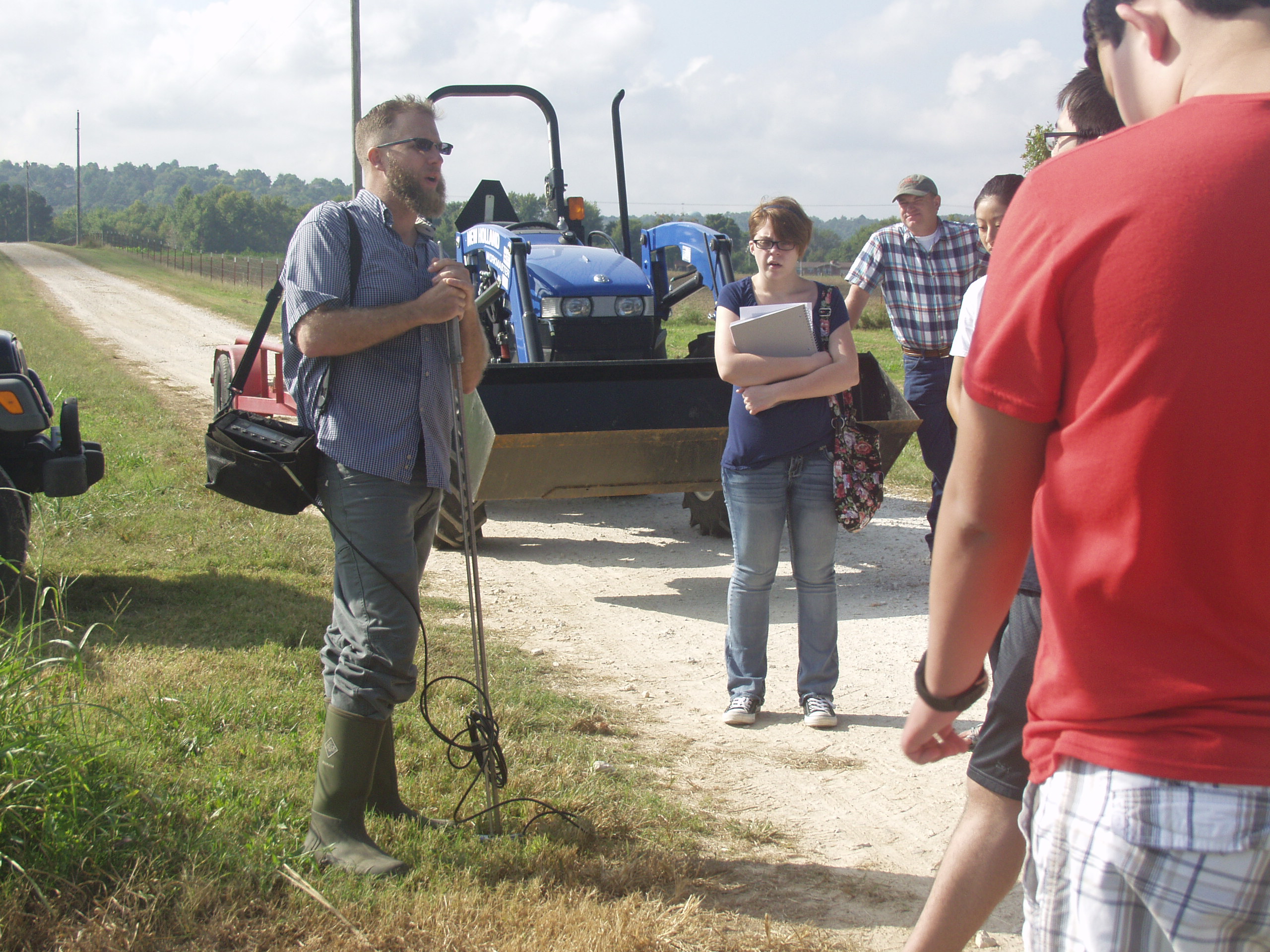
FAYETTEVILLE, Ark. – As he motioned toward a small stream otherwise known as an agricultural ditch that's used mainly to move water away from the fields, Matthew Rich explained how it rated relatively low in terms of water quality standards. Rich, a graduate student in crop, soil and environmental sciences at the University of Arkansas, told a group of high school science students that scientists who assess water quality think in terms of its intended use. He noted that Beaver Lake, the source of drinking water for Northwest Arkansas, must meet the state's highest water quality standards.
Rich was one of several faculty and staff members who demonstrated on-the-scene lessons in environmental and agricultural sustainability Sept. 29 for about 200 high school students who participated in a tour of UA System Division of Agriculture research activities at its Arkansas Agricultural Research and Extension Center north of the campus. The Department of Crop, Soil, and Environmental Sciences sponsored the annual tour. Students from Rogers, Rogers Heritage, Springdale Har-Ber and Danville Two Rivers high schools traveled around the complex throughout the morning to see the presentations.
"Visiting the sites this year gave me a new appreciation of the breadth and depth of the fields of study covered in the Crop, Soil, and Environmental Sciences Department," said Holly Yeatman, department recruiting coordinator. "I learn something new every year, so I'm sure the high school students do as well. This is the seventh year we have offered the field trip, and we always have excellent response from the educational community. The teachers are always appreciative of the opportunities their students have to learn first-hand about some of the ways we are addressing the growing demand for natural resources."
As several students from Rogers gathered by the agricultural ditch, Rich said that in his job as a limnologist (one who studies biological and chemical features of water quality) he first finds out how much water is flowing and what it contains.
"We want to understand the nutrient content," Rich said. "I'll come out here and take a sample of the water body and take it back to the lab to process it. After putting together all this information we can understand the load of nitrates and phosphates that are going downstream."
Rich then showed the students the sloping field adjoining the stream, a riparian zone with plants that can take up some of the stream's nitrates and phosphates. "We have cottonwoods and switchgrass here," he said. "These plants are going to use the nitrates and phosphates to assimilate into their cells to build biomass. That's how they grow tall and big. One purpose of riparian zones is to slow down that water and give this vegetation a chance to take up some of these nutrients and to slow down erosion."
In a nearby field, Alden Smartt of the Crop, Soil, and Environmental Sciences staff greeted the students from the bottom of a freshly dug hole. The texture and shading of the soil wall changes as the depth increases. Examining the characteristics of the soil at various levels enables scientists to create a soil profile.
"Examining a soil profile is a good way to tell whether you should be concerned with erosion or loss of soil and nutrients over the surface of the soil, or the movement of water, nutrients and pollutants," Smartt said.
Smartt described information gained from soil profiles as essential before making decisions to build houses or roads in particular areas. The soil needs to be stable for those purposes. Even if construction of a house is permissible, a basement might not be. He pointed to a level in the hole with reduced iron and pockets of white and gray.
"That's from where the water just stays in those cracks," Smartt said. "That shows there's a water table that's saturated a portion of the year. When you have saturated soil, you know you can't build a basement there."
The students had opportunities to see other demonstrations in the fields and in laboratory buildings. The included soybean seed crossing and data collection, cotton plants' response to stress, wheat breeding and seed processing, native and invasive plants in the weed nursery, using solar energy in irrigation, erosion control, a biodiesel plant demonstration of cooking oil transforming into fuel, a stream table interactive model, development of a biological fertilizer from municipal biosolids and soybean research.
Topics
Contacts
David Edmark, interim coordinator
Division of Agriculture Communications
479-575-6940, dedmark@uark.edu